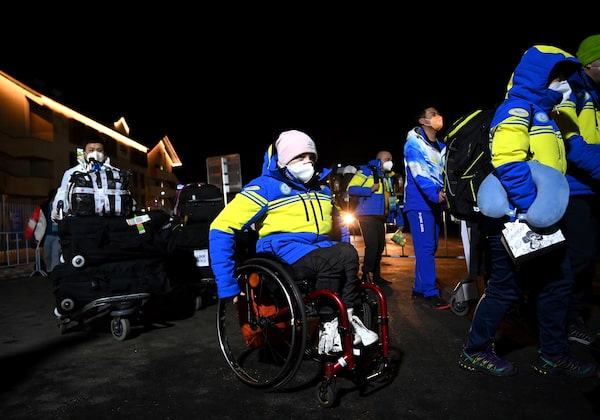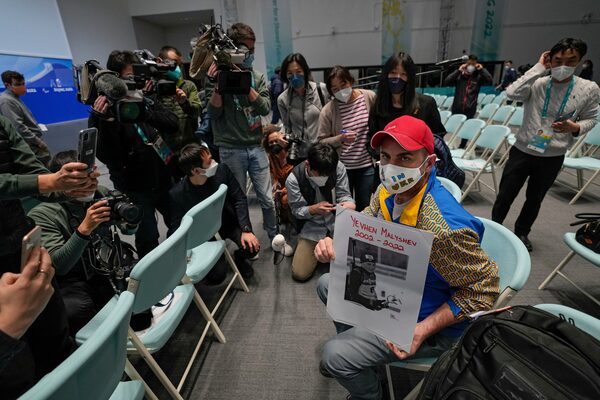
Members of Team Ukraine arrive at the Zhangjiakou Athletes Village on March 2, in Zhangjiakou, China.Alex Davidson/Getty Images
There is a lot of moral courage going around these days. What we have to figure out together is which sort we agree with now that the world has changed.
On Wednesday, the International Paralympic Committee declined to remove the Russian team from the coming Games. Citing its own rules and regulations, the IPC said it lacked the legal basis on which to do so. Instead, the Russians will compete as neutrals.
It was a largely symbolic gesture. Are we really worrying about who’s allowed to play hockey while Kyiv is being flattened? But facing across-the-board international pressure, the IPC held to the basic principle of Olympic neutrality. That took some steel.
The problem is that many people are addressing the same topic, but they aren’t speaking about the same thing. For Ukrainians and their supporters, sports has become war by other means. The new rules of engagement are that there are no more rules.
For the people administrating those sports, they are trying to keep what they see as a path to mutual understanding open for some future, better time.
There’s virtue in both things. But the two kinds have become incompatible and only one is still functional.
Ukrainian athletes ask IOC, IPC to bar Russia, Belarus from events
What’s at issue isn’t the sports or the symbolism. It’s whether that basic principle of a neutral playing ground has survived the past week.
The Paralympics start in earnest on Saturday, if they can get that far. Every time a Ukrainian plays a Russian, it will be newsworthy. Every handshake offered or pulled back is a very big thing.
These athletes are not used to being spokespeople, never mind speaking on behalf of entire countries. The temperature is already very high. At the presser addressing the IPC’s decision, a Ukrainian journalist choked up as he asked officials what they would say to the parents of a young biathlete reportedly killed in Kharkiv on Tuesday.
So this will go badly wrong at some point. A boycott still seems about as likely as any other outcome.
If they go through with it, what we’re about to see is something a lot more real than the sports we are used to – fraught, unpredictable and actually important.
While the sports is happening, the participants will also be field testing a suddenly unpopular proposition: “The Olympics are a good idea.”
In carrying out that test, they’ll address a bunch of sub-questions.
Can we put war (the word “politics” no longer fits in this sentence) to one side and hold a sporting event when one sovereign participant is in the midst of wiping out another?
Should we do that?
If we aren’t going to do that, who’s going to be the first to pass beyond the “speaking our truth” phase and opt out?
Does that mean the rest of the world’s liberal consensus should opt out as well? And if so, for how long? Forever?
If we have just seen the end of one era – roughly speaking, Francis Fukuyama’s vision of The End of History – what does the cultural wing of the new one look like?

A journalist from Ukraine holds a photo of Yevhen Malyshev, a 19-year-old former athlete on Ukraine's junior biathlon team who, according to the International Biathlon Union, died serving the Ukraine military, is surrounded by other journalists after a press conference at the 2022 Winter Paralympics in Beijing, on March 2.Andy Wong/The Canadian Press
These issues are too big for sports. As a political actor, sports is good at peacetime. It has a real way around a truism – “say ‘no’ to racism” or “we’re all on one big team called ‘humanity.’” Sports is not equipped to take on ethical questions once civilization becomes savage.
But this is the world we’ve built for ourselves since the Berlin Wall came down. If we want a monolithic activity through which to negotiate our shared values, it’s either this, shopping or Facebook. Sports seems as good as any other thing.
The problem is tools. Sports doesn’t have any. It has a playbook for scandals (again, a word that no longer fits): make a bad decision; empanel lawyers to investigate how the decision was made; come up with some excuses for that decision; fire the people who made it; hire some new, more palatable people to make equally bad decisions; change nothing.
This is based on the idea that people like their games too much to do anything about it.
We are reaching the “do something about it” stage.
If the Olympics (through the Paralympics) can’t bend to that reality, they risk breaking. These next 10 days will tell us how that worked out.
In times of great peril and fear, our principles become luxuries. In hindsight, we massage the story so that it doesn’t look that way – what epic film doesn’t love recalling the cruel or catastrophic decision avoided, while avoiding talking about all the ones that weren’t?
Now we’re living in that movie – for several coddled generations, for the first time. For all the good they’ve done us, the rules are still being upheld.
That won’t last much longer. Images of Russian Paralympians celebrating their wins will enrage the world. Should some Russian do or say something even slightly provocative, it will be much worse. Sports administration in general will become an inevitable focus of that anger.
That’s the irony here. That in an effort to remain true to its ideal of neutrality, the IPC has just made the whole mission less sustainable.
If the goal was bolstering the palatability of the Olympic movement, the correct decision was turfing Russia (and Belarus), and punting the larger issue of whether the IPC has the power to do so down the road. Who would have tried to stop it? These people are bureaucrats to the end.
Now the decision has provoked a confrontation. With the IPC/IOC on one side waving a copy of the Olympic charter and Ukrainians on the other side waving photos of dead athletes, it’s not hard to see who wins that one.
If the IPC wants to continue holding the Paralympics, it ought to hope everyone involved quits and it has an excuse to cancel them. That is its best-case scenario.
Like so many decisions taken in sports over the past few days, this is down to ‘two worlds’ thinking. The IPC still lives in the world that was before Russia invaded Ukraine. Everyone else is living in the one after.
Until all of us on this side of the line are talking to each other from the same world, very few of the big decisions anyone makes will be workable.
 Cathal Kelly
Cathal Kelly